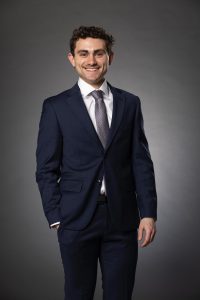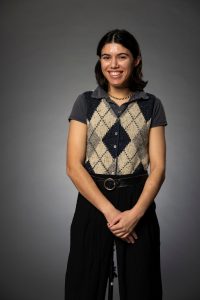Five from the Program on the Environment Join the 2025 Husky 100
Each spring, the University of Washington announces the Husky 100, an honor awarded to just 100 undergraduate and graduate students across all three UW campuses, who exemplify what it means to make the most of their time at the University. Through leadership, service, and academic excellence, these students are recognized for the ways they connect classroom learning with real-world impact.
In 2025, the Program on the Environment reached a milestone: five Environmental Studies majors were selected for the Husky 100 – a record number for the program. These five students – Alec Baron, Elena Vega de Soto, Kort Maeda, Megan Hassi, and Nina Pursai – represent the strength of interdisciplinary education and a deep commitment to environmental justice, public service, and community-driven change.
Together, their Capstone work, facilitated by PoE faculty Sean McDonald, spans recycling reform, electronic waste policy, Indigenous-led climate adaptation, air quality governance, and the intersections of salmon, wildfire, and land stewardship. Though their backgrounds and projects differ, they are united by a shared belief in centering people and communities in the fight for a sustainable and equitable world.
Alec Baron: Systems Thinking for a Circular Future
 Alec Baron’s journey at UW began with a passion for sustainability – but it evolved into something more layered and nuanced. Through courses in the Program on the Environment and Law, Societies, and Justice, Alec learned to approach environmental problems not just as ecological challenges, but as sociological ones, too.
Alec Baron’s journey at UW began with a passion for sustainability – but it evolved into something more layered and nuanced. Through courses in the Program on the Environment and Law, Societies, and Justice, Alec learned to approach environmental problems not just as ecological challenges, but as sociological ones, too.
His senior capstone took him across King County to 150 drop-off recycling sites, where he conducted on-the-ground assessments, surveyed 180 residents, and examined what stops people from engaging with recycling systems. His research advised by PoE faculty Kristi Straus revealed that many barriers were structural: inconvenient site locations, confusing signage, and inconsistent material acceptance. Alec proposed solutions rooted in systems thinking – streamlined legislation, clearer information, and co-located recycling options that reflect how people actually live and move through the county.
“My capstone research immersed me in the recycling framework of King County, enabling me to develop a deep understanding of both the areas needing improvement and the remarkable people and systems already hard at work”, said Alec. “In designing an accessible and efficient process for drop-off recycling, I found engaging with industry experts and residents to be incredibly enlightening, revealing the profound impact of weaving together social responsibility, meaningful regulations, consumer education, and a shared passion for environmental health.”
Outside of his academic work, Alec brought these lessons into his roles as a leader and trainer at Trader Joe’s, practicing collaboration, flexibility, and care in everyday environments. He plans to attend law school to work on issues at the intersection of environmental justice and public health.
Elena Vega de Soto: Bridging Waste Systems and Global Justice
 Elena Vega de Soto is no stranger to complexity. Born in France, raised in the U.S., and deeply shaped by her Spanish heritage, Elena’s life has always been about navigating borders – cultural, linguistic, and now, environmental.
Elena Vega de Soto is no stranger to complexity. Born in France, raised in the U.S., and deeply shaped by her Spanish heritage, Elena’s life has always been about navigating borders – cultural, linguistic, and now, environmental.
“It took me a long time to feel like I could fully define my identity, but now I see it as a strength. It’s given me the ability to move between worlds- culturally, linguistically, and professionally- and to bring people and ideas together to push for more just and inclusive systems. That perspective has taught me that meaningful leadership is curious, collaborative and compassionate.”
Her capstone research tackled one of the most pressing (and overlooked) issues in sustainability: electronic waste. In Washington State, over 44,000 tons of e-waste were produced in 2021. Elena’s work with the King County Solid Waste Division involved evaluating the effectiveness of drop-off recycling programs, interviewing experts, and proposing policy improvements for the state’s E-Cycle program. She also explored how exportation of e-waste harms communities abroad, revealing the global dimensions of local waste decisions.
Elena’s sense of justice is deeply rooted in personal experience and global connection. While studying abroad in Rome, she worked directly with migrants and displaced people through the Sant’Egidio humanitarian organization, listening to refugee stories and researching the links between climate change and migration. On campus, she advocates for reproductive justice and education as an officer for GenAction and fosters UW community spirit as a student handler for Dubs II.
From refugee shelters in Italy to recycling sites in King County, Elena centers her work on human dignity, inclusive communities, and amplifying the voices of those most impacted.
Kort Maeda: Designing for Justice and Indigenous Sovereignty
 Kort Maeda is reshaping how we understand environmental design. As a double major in Environmental Studies and Visual Communication Design – with a minor in Urban Ecological Design – Kort bridges creative practice with climate resilience, always keeping equity at the center.
Kort Maeda is reshaping how we understand environmental design. As a double major in Environmental Studies and Visual Communication Design – with a minor in Urban Ecological Design – Kort bridges creative practice with climate resilience, always keeping equity at the center.
Kort’s capstone, developed in partnership with the Quinault Indian Nation, focused on the Interpretive Trails Project – a community-driven effort to connect the lower and upper village of Taholah as part of a broader relocation plan in response to sea level rise. Kort worked closely with tribal members, facilitating design sessions, conducting ethnobotanical research, and synthesizing insights into trail layouts and educational signage. Her project emphasized the importance of storytelling, Traditional Ecological Knowledge (TEK), and collective data ownership in building meaningful, respectful partnerships.
At UW, Kort’s leadership extended to the Campus Sustainability Fund, where she developed resources and publications that expanded the definition of sustainability to include cultural resilience and interdisciplinary perspectives.
“My time working with the Campus Sustainability Fund taught me the importance of trust and relationship building as foundational to the work of justice-centered sustainability on both the UW campus and across Washington state”, said Kort. “These relationships are ever-evolving and continue to shape my understanding and connection to community-led work.”
Kort is starting her Master of Landscape Architecture program in the fall and hopes to collaborate with tribal governments, nonprofits, and community-based organizations to co-design spaces rooted in justice, culture, and place.
Megan Hassi: Leading with Policy, Advocacy, and Heart
 For Megan Hassi, environmental justice isn’t just a career – it’s a calling that threads together her love of community, policy, and action. Originally from Washington, D.C., Megan brought her activist spirit to Seattle and quickly found a home in the Program on the Environment, where her academic interests crystallized around public policy.
For Megan Hassi, environmental justice isn’t just a career – it’s a calling that threads together her love of community, policy, and action. Originally from Washington, D.C., Megan brought her activist spirit to Seattle and quickly found a home in the Program on the Environment, where her academic interests crystallized around public policy.
Her capstone, conducted through an internship with EPA Region 10’s Tribal Air Team, focused on barriers Tribes face when implementing updates to the Federal Air Rules for Reservations (FARR). She interviewed air quality experts, reviewed outreach strategies, and created a set of policy recommendations aimed at improving collaboration and federal support for Tribal governments.
From her leadership as President of the Environmental Policy Student Association (EPSA) to her experience mapping the Climate Commitment Act with a local nonprofit, Megan consistently shows up to create systems change. Whether she’s organizing teach-ins, hosting policy panels, or guiding hikes with Peaks and Professors, Megan fosters inclusive spaces where students can learn, grow, and act together.
“Through my work with EPSA, I have come to deeply value the power of peer education and community empowerment.” Megan was quick to point out the critical nature of this work by saying, “In these unprecedented times, with environmental policy under attack, staying informed and united is essential to driving meaningful environmental change.”
As she prepares to graduate, Megan plans to pursue a career in environmental policy and advocacy – driven by the same values that have animated her time at UW: justice, courage, and community.
Nina Pursai: Reimagining the Role of Fire in Salmon Conservation
 Nina Pursai’s environmental story begins with a shovel in hand and soil underfoot. A transformative course in Urban Farming with PoE faculty Eli Wheat in her freshman year awakened a passion for sustainable agriculture, and from there, Nina sought opportunities that blended food systems, land stewardship, and justice.
Nina Pursai’s environmental story begins with a shovel in hand and soil underfoot. A transformative course in Urban Farming with PoE faculty Eli Wheat in her freshman year awakened a passion for sustainable agriculture, and from there, Nina sought opportunities that blended food systems, land stewardship, and justice.
Her capstone, developed through an internship with The Nature Conservancy and UW EarthLab, focused on the intersection of wildfires and salmon. While much of the literature treats fire as a threat to aquatic ecosystems, Nina’s research advised by PoE faculty Tim Billo found that salmon can benefit from wildfires in the long term – especially when fires are managed through cultural burning practices led by Indigenous communities. Her systems map revealed gaps in communication between salmon biologists and forest managers, and she proposed ways to build more holistic, inclusive collaboration.
“Through my capstone project, I gained a deeper understanding of the critical role fire plays in shaping stream ecosystems”, said Nina. “As fire safety becomes an increasingly urgent priority in the face of environmental change, fostering dialogue between forest and salmon managers is essential to promoting the health of watersheds, sustaining salmon populations, and benefiting communities.”
Nina’s learning didn’t stop with this research. She studied agriculture in Tuscany, volunteered at the UW Farm, and took on leadership in the Dirty Dozen student club. Through her internship and UW EarthLab cohort, she deepened her commitment to environmental justice and inclusive environmental spaces – especially for women and people of color in conservation.
Looking ahead, Nina plans to pursue work in conservation and ecological restoration, where she can continue to build bridges between research, justice, and community care.
A New Milestone for the Program on the Environment
Having five Environmental Studies majors selected for the Husky 100 is more than a statistical achievement – it’s a reflection of the strength, creativity, and heart of the Program on the Environment.
These students have built their UW careers on curiosity, collaboration, and courage. Whether advocating for cleaner air, equitable recycling, or Indigenous-led design, they’ve connected coursework with community and theory with impact. They are the changemakers we need – now and in the future.
“The Program on the Environment is proud to celebrate these five incredible students,” says PoE Director, L. Monika Moskal. “Their work represents the future of environmental leadership – interdisciplinary, justice-driven, and deeply grounded in community.”
We couldn’t agree more. The work these students have done will ripple outward – into policy, design, research, and activism. As they graduate and move on to new chapters, they carry with them the values of this program and the University of Washington: boundless curiosity, bold leadership, and a commitment to making the world a better place.
Congratulations to the PoE Class of 2025 Husky 100! We can’t wait to see what you do next.